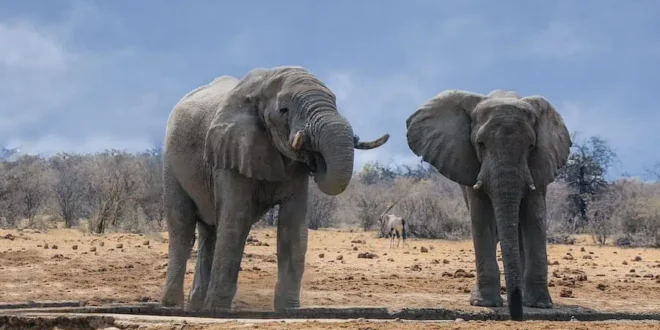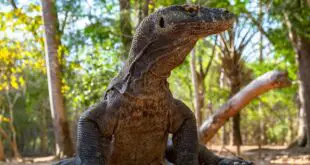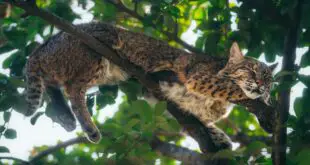You might have encountered a cute photo of an elephant, but do elephants think humans are cute?
Elephants are one of the closest relatives to human beings, with a gene similarity of up to 98% and an ability to display curiosity and empathy towards each other.
Many recognize them as intelligent, and some religions, such as Hinduism, regard them as sacred since some of their gods have elephant heads.
With all the interaction between men and elephants, one might wonder if they find us cute. Well, here’s the whole truth of how elephants see and pursue humans.
So, Do Elephants Think Humans Are Cute?
No. Elephants do not think humans are cute, especially the wild ones. Tamed elephants might enjoy human encounters because they depend on humans for survival. This dependence might have forced them to alter their behavior for their survival.
However, in the wild, elephants are evolutionary hard wired to view humans as a potential threat just like they would a lion. The idea that elephants perceive humans as cute came from a tweet by Julia Hass. But her theory is not scientifically proven.
Elephant Brain Activity On Humans
On December 20th, 2017, a tweeter user named Julia Hass tweeted that she had just learned thatDo Elephants Think Humans Are Cut think humans are cute, just like humans think puppies are cute.
She added that the same part of the brain that lights up when we see puppies also light up on elephants when they see us.
Many responded to her tweet with astonishment in favor of what she had said. However, you cannot believe everything you here on social media.
Researchers have researched the human brain parts that light up in response to certain emotions using an MRI (Magnetic Resonance Imaging). This research is not possible for elephants since:
- There are no large MRIs that could fit on an elephant’s head to carry out the experiment
- The elephant needs to be alive to enable researchers to scan its brain reactions using an MRI effectively.
- It is impossible to know if the areas activated in the elephant’s brain resemble the same emotions, just like humans.
Therefore, Julia Hass’s theory that elephants think humans are cute is still unproven, and we can consider it a myth for now.
Though we can’t prove what elephants think about humans, much evidence shows that they value certain relationships with humans.
On September 14th, 2019, a herd of elephants was passing by a river when a small calf noticed a man by the river.
The calf thought the man was drowning and rushed into the water to save him. The incident describes how elephants value their relationship with humans. But does that mean that elephants can’t attack humans?
Human Elephant Conflict
As much as some tame elephants might be helping people, there are many cases of human-elephant conflicts worldwide. Reports have suggested that an estimated 500 people die from elephant attacks yearly.
Elephants are enormous animals that can grow up to 13 feet tall and weigh up to 6 tons. They are also fast runners and can run up to 25-30 miles an hour. Therefore, when an elephant decides to lay an attack on you, rest assured it will be fatal.
Elephants feed on green plants, and people recognize them as the biggest vegetarians in the world, and they can eat up to 400 pounds a day. So why do they attack humans? Here’s why:
1. Poaching
Back in 1970, the population of African elephants was estimated to be over 1.3 million. However, the population had decreased to 600,000 by the year 1989 due to poaching. Wild elephants view humans as threats, as they witness us kill other elephants.
Elephants have a good memory and can remember people and what they do to them. Therefore, an elephant will attack and kill a human before it gets killed.
2. Deforestation
Elephants are relatively large animals, meaning they need a relatively large environment. As humans try to reclaim land for growing crops and building houses in the forest, they tend to force elephants to move from their habitat.
From human actions, elephants will tend to respond by being aggressive in attempts to protect their homes. Both humans and elephants suffer in the process as they try to fight for space.
3. Food
As humans keep pushing elephants to live in smaller spaces, the elephants tend to suffer from hunger due to less food.
Therefore, they move on to human homes and farms for food and to eat their crops. Food is the leading cause of human-elephant conflict.
As humans see elephants damaging their crops, they tend to retaliate by killing the elephants and even poisoning them.
In 2001 North East of India and Sumatra, more than 60 elephants were found dead in a retaliation incident after they had damaged plenty of crops.
Reports suggested that the plantation workers poisoned the elephants to pay back for what the elephants did to them.
4. Endangering Of Their Offspring
Elephants, just like any other mammal, do not like to see their threats coming near their offspring.
When a wild elephant notices you moving toward its calf, it will charge at you and try to eliminate your life.
On September 27th Taita Taveta County in Kenya, a 71-year-old man was attacked by an elephant as he was in such of his goats.
He was, however, lucky to survive as the elephant noticed her calf in the bushes and went to it. However, the man was hurt and had to call his wife for help.
You might see people touch an elephant’s calf without getting hurt at the zoo and circus and wonder why it is so.
Well, workers at the zoo and circuses have trained these elephants to obey their commands, which is why they do not get aggressive over the same.
5. Boredom And Pressure
People usually force elephants to do stuff at the zoo and the circus, which might result in aggressive behavior.
Elephants love their own space, and they love to roam around freely. When humans take them out of their natural habit and put them in cages, they usually get bored.
The boredom and pressure to perform might trigger them to attack a human and even kill them. Tyke, an African bush elephant, killed her trainer, Allan Campbell, on August 20th, 1994, and fatally injured her groomer, Dallas Beckwith.
Tyke later fled from the arena and onto the streets, trying to escape the pressure from the circus before getting shot dead.
6. Male Elephant In Musth
Musth is a state in which a male elephant is high in testosterone, causing it to be highly aggressive in trying to impress its mates. They might attack any animal, including a lion or human, in their state of aggressiveness.
Testosterone is the hormone that makes men extremely strong, and in elephants, it can mean displaying their wildest behaviors.
Post-Traumatic Stress Disorder (PTSD) In Elephants
A Stanford biologist, O’Connell-Rodwell, stated that the aggression of elephants toward humans is unlike anything she has ever seen.
She added that even terrorist attacks are not violent, as she witnessed elephants frequently killing farmers in India.
Another elephant researcher, Joyce Poole, said that elephants are intentionally killing humans, and she believes it is because of the trauma they suffer.
Many elephants suffer from severe trauma as they witness their family member dying at man’s hands.
Like you, an elephant can’t forget how a family member died. Wild elephants display symptoms associated with human PTSD, so they become more agitated when they see a human.
Additionally, elephants can socially learn, feel and think. When it has a bad experience with a human, it adjusts its behaviors and becomes either more fearful or aggressive. Conversely, it will become friendly to humans if it experiences good emotions.
In Amboseli Park, Kenya, researchers see elephants being fearful/aggressive toward the Maasai community but not toward tourists. The reason being the Maasai regularly spear the elephants, causing them pain.
Measures To Protect Humans And Elephants
If elephants continue to die, we won’t have any by 2050. Therefore, governments have taken specific measures to protect both elephants and Humans. These measures include:
1. Discouraging Poaching
Governments worldwide have discouraged poaching and enacted harsh punitive measures for victims found poaching.
2. Banning Of Ivory Goods
Trade of ivory products such as elephant skin and tusks has become illegal in most parts of the world, reducing their demand.
3. Use Of A Chemical Agent
Capsaicin, a chemical agent found in chili peppers, is employed in making ropes and chili bombs to make fences for elephants. Elephant trunks are highly sensitive to the burn they get from sniffing these ropes; hence they will stay away.
This secret weapon has proven effective in preventing human-elephant encounters hence fewer deaths.
4. Creating Awareness
Elephants are endangered and take a long time to grow and mature. Therefore, creating awareness of the vulnerability reduces their death as humans start to protect them instead of killing them.
Conclusion
The difference between wild and tame elephants denies us a chance to fully discover whether elephants think humans are cute. Elephants are intelligent animals; just like humans, their past experiences can shape their behaviors.
Therefore, an elephant will either like or dislike a human depending on the experience it has had with us. Nonetheless, many causes of human-elephant conflict lead to both deaths. However, the government can install innovative measures to correct it.
 Being Human
Being Human




